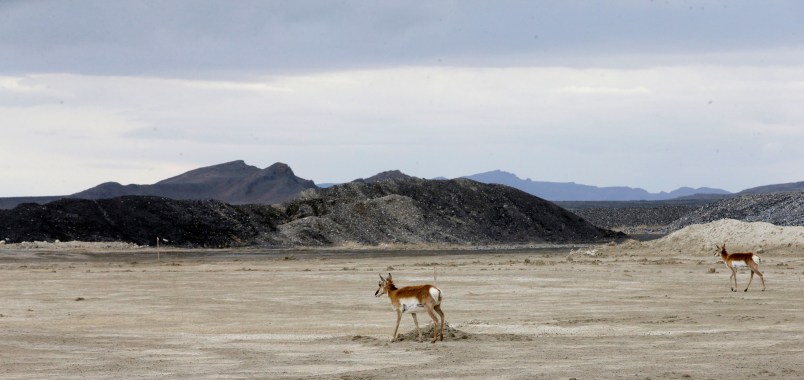CHICAGO (AP) — Environmental groups that have hired scores of new lawyers in recent months are prepared to go to court to fight a sweeping executive order from President Donald Trump that eliminates many restrictions on fossil fuel production and would roll back his predecessor’s plans to curb global warming. But they said they’ll take their first battle to the court of public opinion.
Advocates said they plan to work together to mobilize a public backlash against an executive order signed by Trump on Tuesday that includes initiating a review of former President Barack Obama’s signature plan to restrict greenhouse gas emissions from coal-fired power plants and lifting a 14-month-old moratorium on new coal leases on federal lands. Trump, who has called global warming a “hoax” invented by the Chinese, said during his campaign that he would kill Obama’s climate plans and bring back coal jobs.
Even so, “this is not what most people elected Trump to do; people support climate action,” said David Goldston, director of government affairs at the Natural Resources Defense Council, who said Trump’s actions are short-sighted and won’t bring back the jobs he promised.
The White House did not immediately respond to an Associated Press email seeking comment.
While Republicans have blamed Obama-era environmental regulations for the loss of coal jobs, federal data shows that U.S. mines have been shedding jobs for decades under presidents from both parties because of automation and competition from natural gas and because of solar panels and wind turbines, which now can produce emissions-free electricity cheaper than burning coal.
But many people in coal country are counting on the jobs that Trump has promised, and industry advocates praised his orders.
“These executive actions are a welcome departure from the previous administration’s strategy of making energy more expensive through costly, job-killing regulations that choked our economy,” said U.S. Chamber of Commerce President Thomas J. Donohue.
The order will also chip away at other regulations, including scrapping language on the “social cost” of greenhouse gases. It will initiate a review of efforts to reduce the emission of methane in oil and natural gas production as well as a Bureau of Land Management hydraulic fracturing rule, to determine whether those reflect the president’s policy priorities.
It also will rescind Obama-era executive orders and memoranda, including one that addressed climate change and national security and one that sought to prepare the country for the impacts of climate change. The administration is still in discussion about whether it intends to withdraw from the Paris Agreement on climate change.
Environmentalists say clean energy would create thousands of new jobs and fear that Trump’s actions will put the U.S. at a competitive disadvantage to other countries that are embracing it.
But they believe efforts to revive fossil fuels ultimately will fail because many states and industries already have been embracing renewable energy and natural gas.
“Those decisions are being made at the state level and plant by plant,” said Earthjustice President Trip Van Noppen, who said his group is “continuing to work aggressively to retire dirty coal plants.
“Coal is not coming back,” Van Noppen added. “While the president is taking big splashy action, he is actually doomed to fail.”
A coalition of 16 states and the District of Columbia said they will oppose any effort by the Trump administration to withdraw the Clean Power Plan or seek dismissal of a pending legal case before a federal appeals court in Washington.
Environmental advocates also are ready to go to court on a moment’s notice, and will carefully watch the administration’s actions, said the NRDC’s Goldston.
“The president doesn’t get to simply rewrite safeguards; they have to … prove the changes are in line with the law and science,” Goldston said. “I think that’s going to be a high hurdle for them.”
Jeremy Symons, associate vice president at the Environmental Defense Fund, said advocates will work to build support among lawmakers along with the public.
“In terms of the big picture, our strategy is simple: Shine a spotlight on what is going on and mobilize the public against these rollbacks that threaten our children’s health” and the climate, he said.
Copyright 2017 The Associated Press. All rights reserved. This material may not be published, broadcast, rewritten or redistributed.






